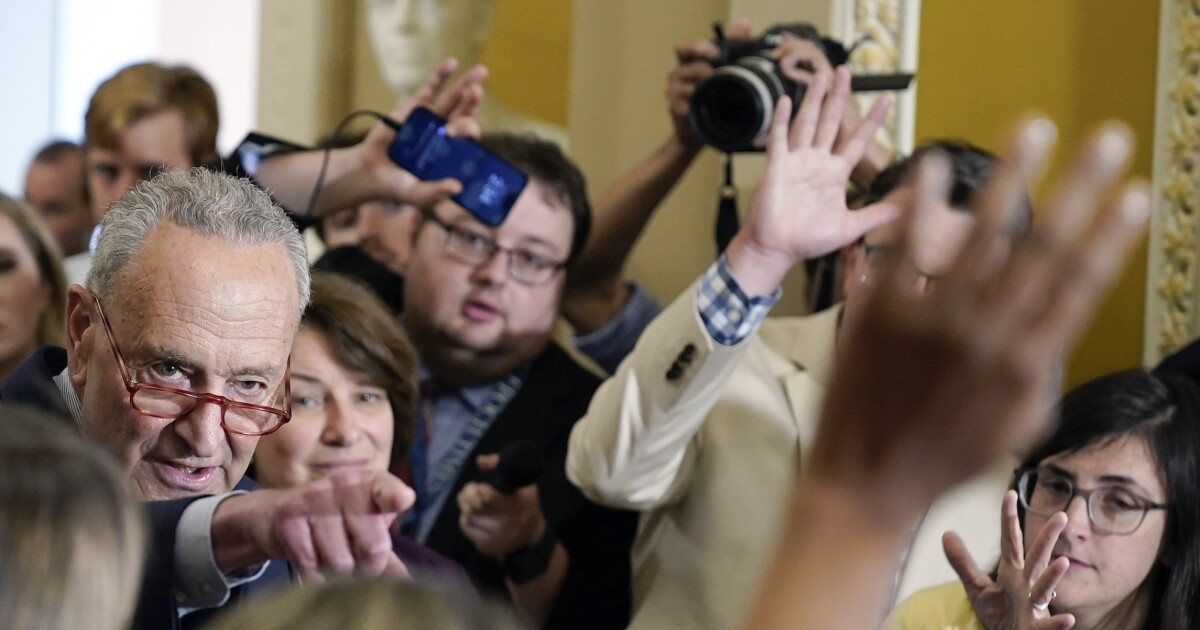

The Senate has just three days to pass its annual defense bill before lawmakers skip town for the August recess.
The deadline is a self-imposed one that would free the chamber up to work through a long to-do list once it returns in September, and Senate Majority Leader Chuck Schumer (D-NY) may be betting that senators won’t stand in the way of passage if it means canceling their flights home.
BIDEN BETS ON ‘ECONOMY GOOD, REPUBLICANS BAD’ REELECTION MESSAGE
The Senate operates by unanimous consent, meaning any one senator can delay the bill. As a result, Schumer is allowing a parade of votes on legislation filed by senators on both sides of the aisle. If passed, the amendments would be attached to the National Defense Authorization Act.
That process started last week, with votes focused heavily on NATO and Ukraine. Senate leadership also agreed to a sweeping package of bipartisan amendments addressing everything from artificial intelligence to competition with China.
But the compressed timeline leaves the chamber little runway to finish up as it resumes voting on Tuesday evening.
The two weeks Schumer set aside was already ambitious — senators were only in town for three days last week, plus the White House congressional picnic and a joint address by Israeli President Isaac Herzog ate up much of Wednesday.
This week will be short, too, with lawmakers leaving for five weeks sometime on Thursday. But a lot could happen between now and then as Senate leaders negotiate a time agreement that would clear the way for the NDAA’s passage.
Republicans are unhappy with how Schumer is managing the floor, lamenting there won’t be enough time for all the desired GOP amendment votes. “What I’m most worried about is he’ll try to jam the bill through at the end without providing the open process that he promised,” Sen. John Cornyn (R-TX), formerly the Senate majority whip, said.
But if Schumer is flexible enough with his Republican counterparts, the bill will pass by Thursday as lawmakers generally expect.
The Senate is working to avoid the same kind of drama that engulfed the GOP-led House as it passed its version of the NDAA earlier this month. The legislation is among the most bipartisan in Congress — it passed out of committee with almost no opposition — but a handful of “culture war” amendments conservatives attached to the bill on the floor led House Democrats to vote against it en masse.
Senate Republicans lack the power to advance their own social agenda; Schumer controls the chamber 51-49. But the rules of the Senate, which give the minority the power to obstruct legislation, are forcing Democrats to yield some ground.
Fifty-one measures made it into the first manager’s package the Senate adopted on Wednesday, 30 of which were either GOP-sponsored or bipartisan. The two sides are negotiating additional amendment votes.
Schumer will allow a vote on at least one controversial measure — a repeal of the Pentagon abortion policy at the center of Sen. Tommy Tuberville’s (R-AL) hold on military promotions. But the concession has more to do with ending the blockade than getting the NDAA passed, and it’s not likely Tuberville will request the vote.
Schumer wouldn’t bring to the floor anything that could derail the bill, meaning the drama, if there is any, will be tame in the Senate compared to how events unfolded in the House.
But the amendment votes he does grant could make for some late nights.
“Hopefully, we’ll get as many of those in the hopper as possible. And then we’ll work late on Tuesday night and work late on Wednesday night and hopefully get people satisfied that it’s been done correctly,” Sen. Mike Rounds (R-SD), a member of the Armed Services Committee, said.
“We’ve really got two long days that we’re gonna try to accomplish a lot of votes on. It’s gonna be a challenge to get it done,” he added.
Of the two votes scheduled so far for Tuesday, one is from Rounds on the sale of U.S. farmland to certain Chinese entities. The second amendment, from Cornyn, would tackle U.S. investment in China and other foreign adversaries.
Senate Minority Whip John Thune (R-SD) hasn’t ruled out negotiating for votes on more controversial bills. “All options are on the table,” he told the Washington Examiner last week.
But a common view among GOP senators is that the NDAA fight is better left to House Republicans in conference, when the two chambers will negotiate a compromise bill. Repeal of the Pentagon policy, which pays for the travel expenses of servicewomen seeking an abortion, was already included in the House-passed legislation, for example, meaning it will have to be addressed by Senate Democrats at some point in the process regardless.
“Rather than spending time on that, realizing that we’re going to have another bite at the apple at a time when we have more leverage because it’s in the bill, that probably just makes more strategic sense,” Sen. Kevin Cramer (ND), another Armed Services Republican, said.
“I call it legislative efficiency,” he added.
CLICK HERE TO READ MORE FROM THE WASHINGTON EXAMINER
Congress will have a long to-do list once it returns from the August recess. Not only will lawmakers have to strike a deal on the NDAA and then fund those defense priorities with a separate funding bill, but the government as a whole will shut down if Congress cannot complete all of its appropriations bills by Sept. 30.
Also on the docket is a five-year reauthorization of the Federal Aviation Administration.





